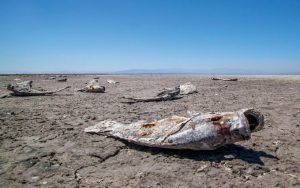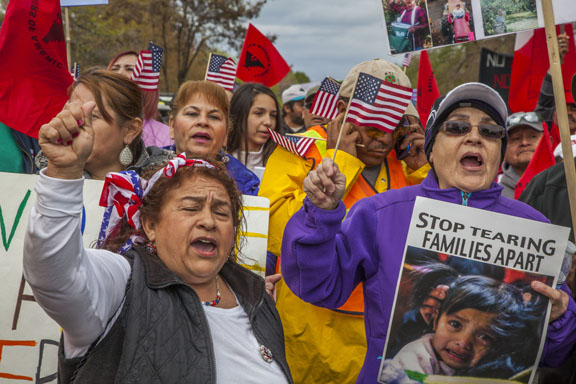An Interview with Christian Parenti by Vincent Emanuele
.jpg) Truthout, May 17, 2015
Truthout, May 17, 2015
On April 19, 2014, I sat down with author, journalist and professor Christian Parenti in Chicago. His work, which is wide-ranging and essential, explores some of the most powerful and brutal forces in our society: war, capitalism, prisons, policing and climate change. In this interview, we discussed ideology, climate change, Marxism, activism, the state, militarism, violence and the future. This is the first of a two-part interview.
Vincent Emanuele for Truthout: I’d like to begin by revisiting your 2011 book, Tropic of Chaos: Climate Change and the New Geography of Violence. Right around the time Tropic of Chaos was published, Syria was experiencing record drought and massive livestock and crop losses. The connections between neoliberalism, climate change and Cold War-era militarism, for you, were on full display. However, you’re clear in noting that climate change exacerbates pre-existing crises. In other words, climate change is not necessarily the driver of crises in Syria, or Afghanistan, for example. You call this process the "catastrophic convergence." Can you talk about these various themes in the context of the last four years since Tropic of Chaos was published?
Christian Parenti: Syria is a prime example. There has been a terrible drought there, which coincided with austerity measures imposed by the Assad government cutting aid to Sunni farmers. Many of them were forced to leave the land, partly due to drought, partly due to the lack of support to properly deal with the drought. Then, they arrive in cities, and there’s more austerity taking place. This is experienced as oppression by the Alawite elite against an increasingly impoverished Sunni proletariat who’ve been thrown off their land.
This situation then explodes as religious conflict, which is really the fusion of environmental crises with neoliberal economic policies. Of course, the violent spark to all of this is the fact that the entire region is flooded with weapons. Some of these weapons are from the Cold War, and some of those guns are from recent US militarism in the region. There were a lot of vets of the anti-US struggle in Iraq who are Syrian – Mujahideen veterans who went to Iraq and came back to Syria and started to fight. There were Syrians who were selling guns to Iraqi underground groups. These groups were buying their guns back, and re-importing them to Syria. My friend David Enders has reported on this really well.
So, it’s a perfect example of this catastrophic convergence: The landscape is littered with guns, hammered socially by increasingly market-fundamentalist politics, and at the same time, natural systems are beginning to buckle and break as climate change starts to accelerate. Part of what’s fueling the sectarian conflict in Iraq has to do with this convergence. There’s a very serious lack of water in southern Iraq, partly because Turkey has been taking more water than they should, but there’s also a decline in precipitation, misuse of water resources, etc. In the Shia heartland, life is tough. These young farmers get pulled into the struggle against the Sunni, with militias or within the Iraqi Army. That’s a better deal than trying to struggle on an increasingly decimated farm. But it’s hard to research a lot of this. The violence is so intense that it makes reporting on these issues virtually impossible. Those are some examples that immediately come to mind.
As you’re responding, I’m thinking of Yemen. Really, your book has forced me to constantly examine the underlying environmental context when thinking about conflicts, wars and violence. Yet, this dynamic is left out of the narrative in the mainstream media, and even in many alternative outlets.
People have been reporting on Sanaa’s water crisis for several years. Yemen’s environmental crises is partly fueling the current conflict. Similarly, Boko Haram is capitalizing on and partly produced by environmental crises in northern Nigeria. Large parts of the West African Sahel – meaning the wide arid belt at the bottom edge of the Sahara desert – have been experiencing all sorts of natural precipitation fluctuations; too much rain, too little, at the wrong times. This, plus rising temperatures, has led to increased climate migration, urbanization, poverty, and – surprise, surprise! – political desperation. These chaotic weather patterns are linked to climate change.
Along with environmental crisis, Boko Haram is the byproduct of the brutality of the Nigerian security forces, which have targeted Northern Nigerian Muslims with wide, undisciplined, sometimes almost indiscriminate terror campaigns. Add to that the total corruption of the Nigerian oil state and its inability and unwillingness to redistribute wealth and resources to marginalized populations, and it’s a perfect storm. And out of this drama comes that nightmare we call Boko Haram.
To answer your initial question, what’s new since publishing the book? Seems like more of the same is spreading. But, to be perfectly honest, I find it profoundly depressing to think about this stuff all the time. My research has moved on to other questions.
You focus a lot on the Global South in Tropic of Chaos, but you briefly mention the Global North as well. However, you mention that this catastrophic convergence is experienced in a much different way depending on where one is located. Can you explain these differences?
Climate violence in the Global North looks like counterterrorism and counterinsurgency operations abroad, and xenophobic border policing and anti-immigrant repression at home. As we’re speaking, the US has battleships off the coast of Yemen, supporting the Saudi air offensive. Climate violence looks like the special operations base that was in Yemen before US forces were run out a few weeks ago. That base was there partly because of the instability caused by the growing climate crisis that is fueled by US militarism and neoliberalism. The media might not call counter-terror operations climate wars, but that’s certainly part of what drives them.
Similarly, anti-immigrant detention and policing increasingly have a climate angle. Migration is rarely described in terms of its root causes. What is it that drives people off the land and forces them to migrate north? War, environmental crisis, and neoliberal economic restructuring that, by opening markets and removing state supports to popular classes, have destroyed rural economies, peasant livelihoods, all over the world. Much of Latin America, particular Mexico and Central America, have been experiencing the chaotic weather associated with climate change, extreme droughts punctuated by flooding. People are forced by all these factors to seek a better life abroad.
The media might not call counter-terror operations climate wars, but that’s certainly part of what drives them.
Greeting them upon arrival in the Global North – be that Texas or Sicily – are the ideology and infrastructure of xenophobia and militarized policing. The right, both in Europe and the US, uses racist, fear-mongering, anti-immigrant rhetoric to great effect in mobilizing their constituencies. Remember, the right needs emotionally charged electoral spectacle, because their real agenda is the upward redistribution of wealth from the working classes to the rich. But right-wing politicians cannot run on that platform: there aren’t enough rich people. So, the right must appeal to the real fears of regular people, but they pander to these fears using fake issues. Thus in the right-wing imaginary, it’s not the erosion of social democracy and the rise of deregulated, deindustrialized, hyper-privatized, financialized, boom and bust, neoliberal capitalism that has fucked the common person. No, it is foreigners and immigrants. Unfortunately, this rhetoric works with many. (Continued)
Continue reading Climate Change, Militarism, Neoliberalism and the State



.jpg) Truthout, May 17, 2015
Truthout, May 17, 2015